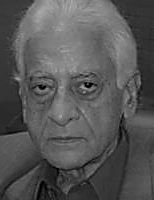 Zahid Dar
Zahid Dar
(Zāhid Ḍār)
b. 1936
 Zahid Dar
Zahid DarZahid Dar (Zāhid Ḍār; b. 1936) was born in Ludhiana, Punjab, where he received his early education. His family moved to Lahore at the time of Partition. He enrolled in Government College, Lahore, in 1952 and remained there for two years without taking a degree. He then undertook various odd jobs, none of which suited him, so he decided he would spend his time reading, during which his family supported him.
In 1960 he sent several of his early poems to critic-editor Muhammad Hasan Askari (1919-78), who had just started a new journal, Sāt rang (Seven Colors). Three of these were published under the pseudonym “Mādho” in the May-June issue (pp.72-73): “Vapsī” (Return),* “Nazm” (Poem), and “Zavāl kā din” (Day of Decline).* They provoked a great deal of interest; readers—even from India—were writing the editor asking who “Mādho” was. The prominent novelist Intizar Hussain (1923-2016) published a short piece in the August 1960 issue of the journal entitled “Pūchte hain vah kih mādho kaun hai” (They’re Asking: Who Is Madho?”; pp. 24-25). There is an irony in this question, for he and the young poet were friends, often meeting at the Lahore Pak Tea House, a popular haunt for writers, scholars, and intellectuals. It appears that the poet had not told the novelist that he had submitted the poems.
Dar was a supporter of the 1960s Movement of the New Linguistic Constructions, which sought to modify “classical” Urdu language and speech to allow for a more casual, fluid, “everyday” language to accommodate the fact that most Pakistanis do not speak Urdu as their first language. He has published three volumes of poetry: Dard-i shahr (Suffering of the City; 1965; poem “Dard kā shahr” [City of Suffering]*); Tanhā‘ī (Solitude), and Ānkh men samandar: intikhāb (Ocean in the Eye: Selection; 1987). The third volume contains most of the poems from the first two.
1. Āg kī āg̲h̲osh men̲ / In Fire’s Embrace
2. Amrīkā kā k̲h̲udā / America’s God
7. Dard kā shahr / City of Suffering
8. Dil ke andar / Inside the Heart
12. Kitne mausam . . . / How Many Seasons . . .
13. Merā pāgal pan / My Madness
14. Socne ke liye kuch nahı̄n̲ / Nothing to Think About
17. Zamīn, merī bahn / Earth, My Sister

